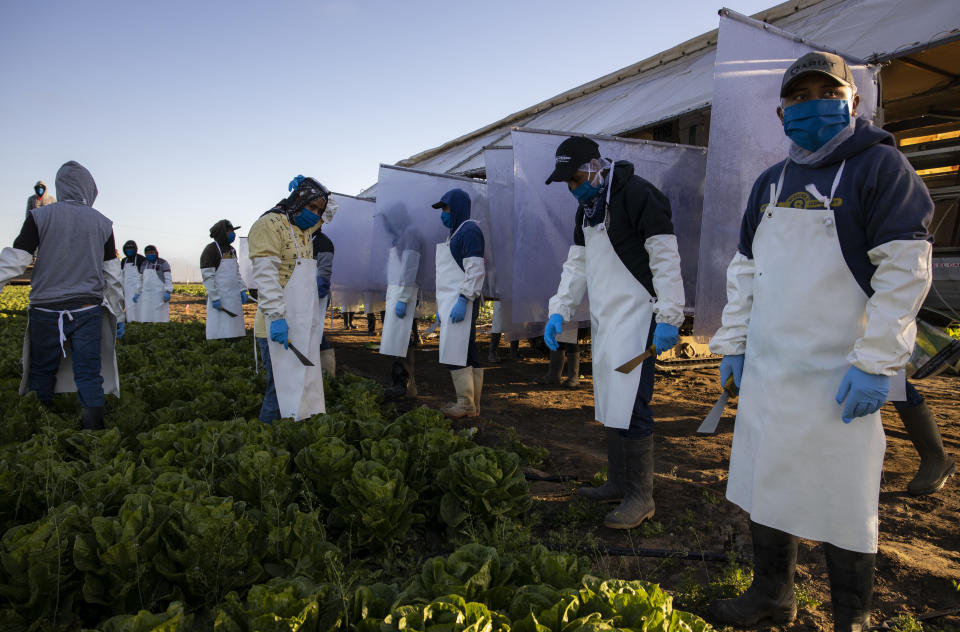Why Trump’s plan to curtail immigration will slow the coronavirus recovery
As the total amount of Americans applying for unemployment benefits since the coronavirus crisis began was surpassing 26 million last week, President Trump unveiled his latest plans to curtail immigration in what he says was an attempt to defend American jobs and the economy.
Despite originally boasting a complete halt to immigration, Trump signed a watered down executive order on April 22 that paused the issuances of new green cards for 60 days with carved out exemptions for migrant workers and wealthier applicants. Shortly after, economic adviser Stephen Miller reportedly held a private call for conservative supporters promising it was just a small step in a larger plan to reduce immigration even further.
The plan has a rather large problem, however. According to leading economists, by limiting immigration, the Trump administration will inevitably dampen whatever economic recovery unfolds once states lift coronavirus lockdown orders.
“There's a lot of research that shows that in normal times, reducing immigration does not have a positive effect on American opportunities,” University of California at Davis Economics Professor Giovanni Peri told Yahoo Finance. “So the premise is not sound in terms of data and economics, and in this particular case when clearly the root of unemployment and loss of jobs are very different, it's even less to the point to do something like this.”
In looking at the effect of immigration on the overall economy a Moody’s Analytics and ProPublica report in 2017 posited that a 1% increase in the U.S. population would correlate with a 1.5% increase in America’s gross domestic product. Certain states, including Nevada and California, are even more dependent on immigration for sourcing workers across many sectors.
Especially at a time when unemployment seems poised to hit depression-era levels, Harvard economist and former Chair of the Council of Economic Advisers under President Obama Jason Furman explains that limiting immigration could put the U.S. on a dangerous path to anemic economic growth similar to what’s plagued Japan.
“One of the big challenges Japan has had in its economy is they don't have the number of immigrants,” Furman said. “In the United States, our workforce would shrink, not grow, and it would not help us repay all of the debt we're incurring right now.”
‘Worst idea since defunding WHO’
Leadership outside the White House has offered a stark contrast to the anti-immigration rhetoric coming from the Trump administration. Earlier this month, California Governor Gavin Newsom coordinated $125 million for a stimulus fund for undocumented immigrants in the state. The move was attacked by conservative Republicans, but defended by economists like Peri who were quick to point out the fact that undocumented workers living in the state still pay taxes despite not having citizenship.
“We estimate they've contributed a lot in state taxes and local taxes, up to $2.5 billion to the coffers of the California, so this is a little gesture,” he said. “But it's an important gesture to show the importance of this group in the California economy and to emphasize how needed they are and how in this very tough time they also need some protection.”

Keeping immigrants here that are doing their part to grow the economy will be an important piece of the post-coronavirus recovery, whether Trump admits it or not, Peri says. Incentivizing workers to leave, or complicating hiring efforts at precisely the time you hope to see unemployment drop is a problem.
“You're reducing the ability of these sectors to grow, to have companies that employ more people, and therefore to also be employing American workers,” Peri said.
Furman went even further, calling Trump’s apparent plans to outright eliminate immigration “the worst idea since defunding the World Health Organization.”
“We need competitive industries. We need competitive businesses to have jobs. Immigrants are a really important part of that, they contribute to our economy,” Furman said. “American businesses won't be able to recover if we make this country a less attractive place to work and do business.”
Zack Guzman is the host of YFi PM as well as a senior writer and on-air reporter covering entrepreneurship, cannabis, startups, and breaking news at Yahoo Finance. Follow him on Twitter @zGuz.
Read the latest financial and business news from Yahoo Finance
Read more:
Small US towns are neglected from coronavirus relief and it's a 'slap in the face': Georgia mayor
Coronavirus job losses hit these 10 states the hardest
The coronavirus just doubled the risk of mass bankruptcies
Follow Yahoo Finance on Twitter, Facebook, Instagram, Flipboard, SmartNews, LinkedIn, YouTube, and reddit.